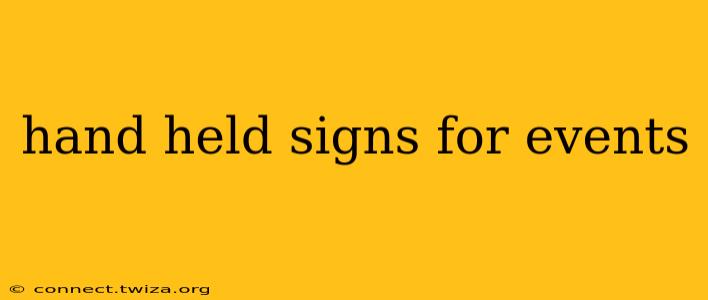Hand-held signs are a versatile and cost-effective way to enhance any event, from small gatherings to large-scale festivals. Whether you're promoting a cause, directing attendees, or simply adding a fun, visual element, the right sign can make a significant difference. This guide delves into the key aspects of creating and utilizing effective hand-held signs for events, ensuring your message resonates with your target audience.
What Makes a Hand-Held Sign Effective?
A successful hand-held sign goes beyond just words on a piece of cardboard. Several factors contribute to its effectiveness:
-
Clear and Concise Messaging: Avoid overwhelming text. Focus on a single, impactful message that's easily readable from a distance. Keep it short, sweet, and to the point.
-
Visually Appealing Design: Think beyond simple text. Incorporate striking visuals, bold colors, and eye-catching fonts to grab attention. Consider using images or logos to enhance brand recognition.
-
Appropriate Size and Material: The sign should be large enough to be easily seen but small enough to be comfortably held. Choose durable materials that can withstand the event's conditions (weather, crowds, etc.).
-
Strategic Placement: Consider where the sign holders will be positioned to maximize visibility and impact.
What Types of Events Benefit from Hand-Held Signs?
Hand-held signs are remarkably adaptable and can benefit a wide variety of events:
-
Protests and Rallies: Convey powerful messages and unite participants.
-
Political Campaigns: Promote candidates and share key policy points.
-
Festivals and Concerts: Direct attendees, advertise sponsors, or simply add to the festive atmosphere.
-
Marathons and Sporting Events: Provide directions, encourage participants, or celebrate achievements.
-
Trade Shows and Conferences: Showcase products, services, or company branding.
-
Weddings and Parties: Add personalized touches, guide guests, or create a memorable photo opportunity.
What Materials Should I Use for Hand-Held Signs?
The best material for your hand-held signs will depend on your event and budget:
-
Cardboard: A budget-friendly option, ideal for short-term use. However, it's susceptible to damage from weather or rough handling.
-
Foam Core: More durable than cardboard and offers a smooth surface for writing or printing.
-
Plastic Signs: Excellent for outdoor events, offering weather resistance and longevity.
-
Plywood: A robust choice for long-term use, particularly in demanding environments.
Remember to consider the weight of the material, especially for long events.
How Do I Design an Effective Hand-Held Sign?
Effective design is crucial for maximum impact. Here are some key design considerations:
-
Font Choice: Select clear, easy-to-read fonts that are visible from a distance. Avoid overly stylized or decorative fonts.
-
Color Palette: Use contrasting colors to ensure readability. Bold, bright colors are generally more effective in grabbing attention.
-
Image Selection: If using images, ensure they're high-quality and relevant to your message.
-
Layout: Keep the layout simple and uncluttered. Use ample white space to avoid overwhelming the viewer.
What are Some Common Mistakes to Avoid When Making Hand-Held Signs?
Avoiding these common pitfalls will significantly improve your signs' effectiveness:
-
Using illegible fonts or tiny text.
-
Overcrowding the sign with too much information.
-
Choosing colors that don't contrast well.
-
Using low-quality images or graphics.
-
Failing to consider the event's environment (weather, lighting, etc.).
How Can I Make My Hand-Held Signs Stand Out?
To make your hand-held signs truly memorable, consider these ideas:
-
Use bright, eye-catching colors.
-
Incorporate creative graphics or illustrations.
-
Add interactive elements (e.g., QR codes).
-
Use unique fonts or lettering styles.
-
Personalize the signs to connect with your audience.
By following these guidelines, you can create impactful hand-held signs that effectively communicate your message and enhance your event's success. Remember, a well-designed sign is more than just a piece of signage; it's a powerful tool for communication and engagement.
